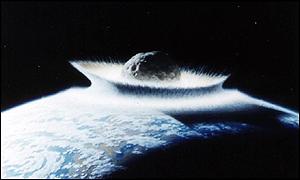
Posted on 05/12/2006 11:49:03 AM PDT by blam
Tsunami risk of asteroid strikes revealed
18:18 12 May 2006
NewScientist.com news service
Jeff Hecht

The researchers modelled the asteroid impact believed to have led to the demise of the dinosaurs – this frame shows tsunami wave heights 4 hours after the impact of the 10-kilomtre-wide asteroid (Image: Steve Ward)Related Articles
Tsunamis triggered by asteroid impacts cause a disaster similar to the 2004 Asian tsunami once every 6000 years on average, according to the first detailed analysis of their effects.
Researchers have assumed that tsunamis would make ocean impacts more deadly than those on land. But Steve Chesley at the Jet Propulsion Laboratory in Pasadena, and Steve Ward at the University of California at Santa Cruz, both in the US, are the first to quantify the risks.
The pair first calculated the chance of various size asteroids reaching the Earth's surface, and then modelled the tsunamis that would result for asteroids that hit the oceans.
For example, the model shows that waves radiating from the impact of a 300-metre-wide asteroid would carry 300 times more energy than the 2004 Asian tsunami. You can view movies of impact simulations in the North Atlantic, South Atlantic, Gulf of Mexico and Pacific (all in .mov format).
Fifty million people
To accurately assess the overall impact-tsunami risks, the analysis included the full range of asteroid sizes, including the smallest asteroids capable of penetrating the Earth's atmosphere. These are between 60 and 100 metres, depending on their composition.
The most common asteroids, between 100 m and 400 m, would yield tsunami waves up to 10 m when they arrived at the coast. A total of about 50 million coastal residents are vulnerable to such waves, though no single impact would affect them all. The researchers predict a tsunami-generating impact should occur about once every 6000 years, and would on average affect over one million people and cause $110 billion in property damage.
The study also showed that asteroid impacts in the 300-metre class might be similar to the huge tsunamis thrown up when massive chunks of rock break from the sides of volcanoes and fall into the ocean. These events are also thought to occur roughly once every 6000 years.
The analysis confirms suspicions that tsunamis are the biggest risk posed by asteroid impacts. The risks from climate effects of big impacts – through dust and smoke that blocks out the Sun – are about two-thirds that of tsunamis, while those of land impacts are about one-third of the tsunami risk.
Hurricane aspects
"There still are a lot of uncertainties," Chesley cautions. The solar system's population of 100 m to 400 m asteroids is poorly known, as are coastal population distributions. A big question is how the waves would behave when they reach the shore; successive wave peaks are much closer together in asteroid tsunamis than in earthquake tsunamis (see a simulation of an asteroid hitting the water, here).
But the ultimate uncertainty is when and where an asteroid might hit. "Asteroids sprinkle down pretty much at random," says Ward, "They don't pick out California or Florida."
And, like hurricanes, location is the key. Hurricane Katrina became America's worst natural disaster in living memory not because it was the biggest storm, but because it made a direct hit on vulnerable New Orleans.
But while hurricanes are difficult to predict, they do follow the same general paths. Asteroids come out of the blue – literally.
Journal reference: Natural Hazards (vol 38 p 355)
Catastrophism ping.
In the Niven/Pournelle book "Lucifer's Hammer" from the 1970s they talk about this. If it hits land, it's pretty much tough luck for anyone under it. If it hits water, it's very bad globally. Besides the tsunami, it would also instantly vaporize a huge volume of water into the atmosphere.
Great book.

Great Book...great survival guide
if a small planetoid hits the earth i don't think waves would be our biggest problem
The first is fairly well known. The second is well known. The Gulf of Mexico is suspiciously round for a large feature.
What kind of English format is this title? Does it not make sense to anyone else?
http://www.freerepublic.com/focus/f-news/1619315/posts
"He [Eric Julien, a former French military air traffic controller and senior airport manager] concludes the May 25 event is tied in to the Bush administration's policy of preemptive use of nuclear weapons against Iran, and the effect of nuclear weapons on the realms of higher intelligences."
I cannot say it, but as you see, it is ___'s fault.
How do you know this? Has this been proven by MIT scientists?

Great Book...great survival guide
Loved that book, but some of those books are impossible to find nowadays. Roberto Vacca's book is particular difficult to find.
A buoyant flood road, piano hinged on land side, dead man anchored on sea side; that naturally swings up into a vertical seawall, would at least mitigate some of the wave damage. Do you have a better solution?
One of my favorites
"Besides the tsunami, it would also instantly vaporize a huge volume of water into the atmosphere."
Wonder how long it would take, for such a huge volume of seawater to precipitate back to ground? I''d think that salt damage to productive agricultural lands would be a potential problem lasting long after other damage is repaired as well.
The wave aspect of everything.
Disclaimer: Opinions posted on Free Republic are those of the individual posters and do not necessarily represent the opinion of Free Republic or its management. All materials posted herein are protected by copyright law and the exemption for fair use of copyrighted works.